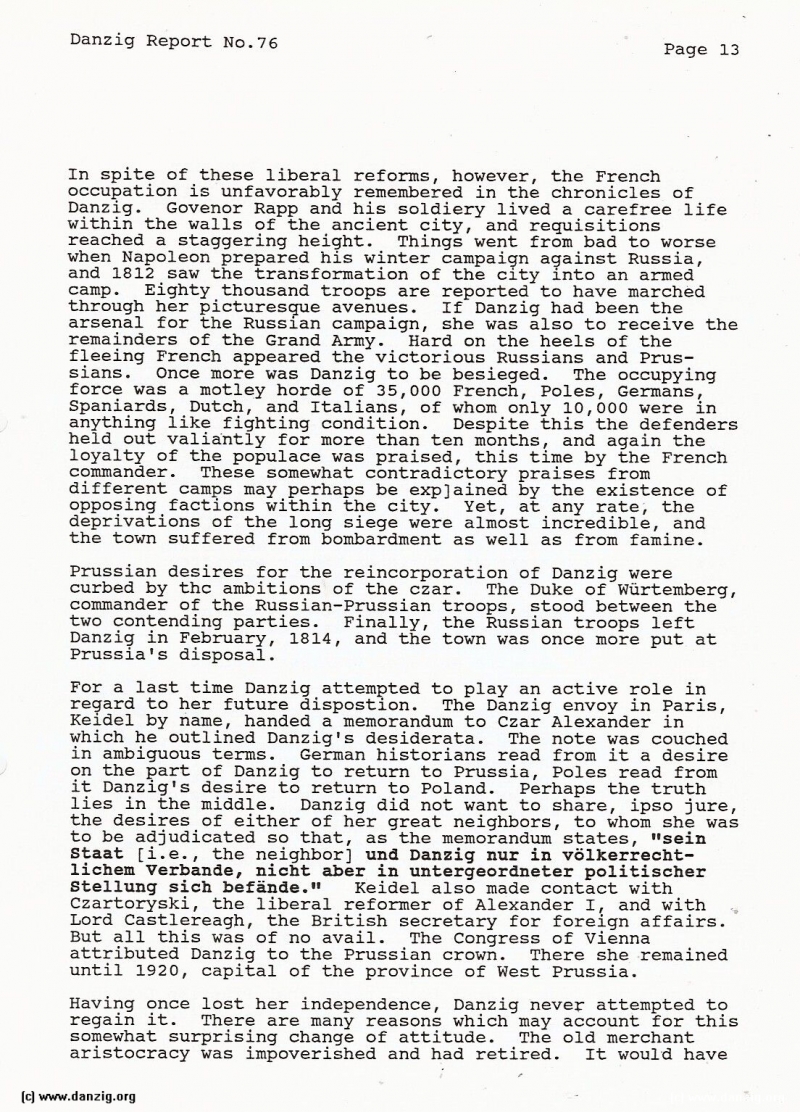
In spite of these liberal reforms, however, the French occupation is unfavorably remembered in the chronicles of Danzig. Govenor Rapp and his soldiery lived a carefree life within the walls of the ancient city, and requisitions reached a staggering height. Things went from bad to worse when Napoleon prepared his winter campaign against Russia, and 1812 saw the transformation of the city into an armed camp. Eighty thousand troops are reported to have marched through her picturesque avenues. If Danzig had been the arsenal for the Russian campaign, she was also to receive the remainders of the Grand Army. Hard on the heels of the fleeing French appeared the victorious Russians and Prus— sians. Once more was Danzig to be besieged. The occupying force was a motley horde of 35,000 French, Poles, Germans, Spaniards, Dutch, and Italians, of whom only 10,000 were in anything like fighting condition. Despite this the defenders held out valiantly for more than ten months, and again the loyalty of the populace was praised, this time by the French commander. These somewhat contradictory praises from different camps may perhaps be exp)ained by the existence of opposing factions within the city. Yet, at any rate, the deprivations of the long siege were almost incredible, and the town suffered from bombardment as well as from famine.
Prussian desires for the reincorporation of Danzig were curbed by thc ambitions of the czar. The Duke of Würtemberg, commander of the Russian-Prussian troops, stood between the two contending parties. Finally, the Russian troops left Danzig in February, 1814, and the town was once more put at Prussia’s disposal.
For a last time Danzig attempted to play an active role in reard to her future dispostion. The Danzig envoy in Paris, Keidel by name, handed a memorandum to Czar Alexander in which he outlined Danzig’s desiderata. The note was couched in ambiguous terms. German historians read from it a desire on the part of Danzig to return to Prussia, Poles read from it Danzig’s desire to return to Poland. Perhaps the truth lies in the middle. Danzig did not want to share, ipso jure, the desires of either of her great neighbors, to whom she was to be adjudicated so that, as the memorandum states, “sein Staat [i.e., the neighbor) und Danzig nur in völkerrechtl ichem Verbande, nicht aber in untergeordneter politischer Stellung sich befände.” Keidel also made contact with Czartoryski, the liberal reformer of Alexander I, and with Lord Castlereagh, the British secretary for foreign affairs. But all this was of no avail. The Congress of Vienna attributed Danzig to the Prussian crown. There she remained until 1920, capital of the province of West Prussia.
Having once lost her independence, Danzig never attempted to regain it. There are many reasons which may account for this somewhat surprising change of attitude. The old merchant aristocracy was impoverished and had retired. It would have
Danzig Report Vol. 1 - Nr. 76 - July - August - September - 1992, Page 13.
Hits: 3947
Added: 02/07/2015
Copyright: 2025 Danzig.org

